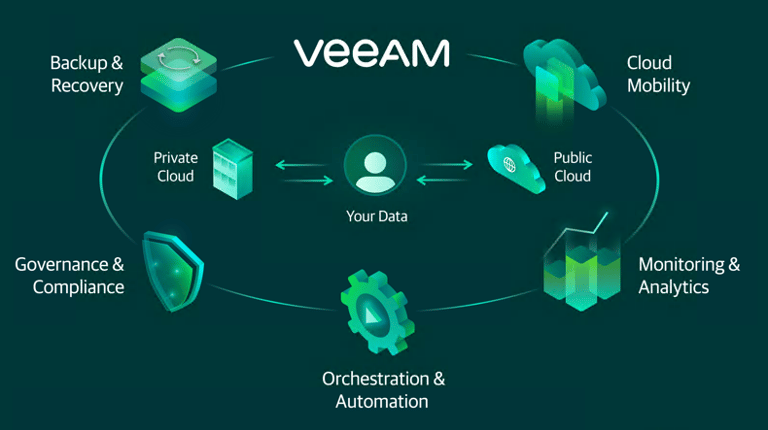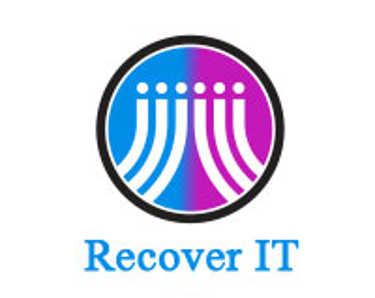Our "Backup and Replication" solution with "Veeam" ensures data backup and recovery of both virtual and physical environments as well as cloud-based workloads.
This service offers a variety of functions that enable a comprehensive data backup strategy.
The benefits of backup and replication include:
Fast backup and recovery of virtual machines and physical servers.
Cloud-based backup.
Veeam Backup Supports different backup methods, such as incremental or differential backups.
Backup service offers your company central management and automation of backup processes. In addition, Veeam Backup & Replication offers the "Instant VM Recovery" function, which enables virtual machines to be restored within a few minutes after a failure. The software also supports the backup of applications such as Microsoft Exchange or Microsoft SharePoint and offers deduplication options to use storage space efficiently.
Enterprise applications: Microsoft SQL, Exchange, SharePoint, Active Directory, SAP HANA, Oracle RMAN, Kubernetes, MySQL, PostgreSQL
NAS file servers
Veeam Backup & Replication supports a wide range of backup destinations and is compatible with both VMware vSphere and Microsoft Hyper-V.
Backups can also be copied to local storage.
Daten Backup & Replication


The Importance of Data Backups: A Comprehensive Overview
In our increasingly digitalized world, data has become an invaluable asset. Whether it's private photos, important documents, or business information, losing data can have serious consequences. Data loss can occur due to a variety of causes, such as hardware failures, software errors, natural disasters, or cyberattacks.
Why are data backups so important?
Loss of precious memories: Photos, videos, and other personal files cannot be easily replaced.
Financial loss: Losing business data can result in significant financial losses, especially when it comes to customer information, accounting records, or development projects.
Time expenditure: Restoring lost data can be very time-consuming and costly.
Loss of reputation: Data loss can damage the trust of customers and business partners.
What does a comprehensive backup include?
A good backup usually includes the following elements:
Full backup: All important data should be fully backed up on a regular basis.
Incremental backups: To save time and storage space, only the changes since the last full backup are usually backed up.
Offsite storage: A copy of the backup should be kept in a safe location off-site to protect against local disasters.
Testing recovery: Regularly testing recovery processes ensures that data can be restored in the event of an emergency.
What backup strategies are there?
Local backups: On external hard drives, USB sticks or network storage.
Cloud backup: Storing data on external servers that are accessible via the Internet.
Combination of both: A combination of local and cloud storage provides additional protection.
Tips for a secure backup:
Regularity: Perform regular backups to minimize data loss.
Variety: Use different backup methods and storage locations to spread risks.
Automation: Use automated backup tools to simplify the process.
Encryption: Protect your data from unauthorized access with encryption.
Would you like to learn more about specific aspects of data backup? I would be happy to provide you with more information on the following topics:
Backup software
Cloud storage solutions
Business backup
Mobile device backup
Our solution
The advantages of data backups in protection against natural disasters and viruses
A well-thought-out data backup is your insurance against unexpected data loss. It offers decisive advantages, especially with regard to natural disasters and viruses:
Protection against natural disasters:
Protection against physical destruction: In the event of floods, fires or earthquakes, physical storage media such as hard drives or servers can be destroyed. Regular backups to external storage media or in the cloud keep your data safe, even if your hardware fails.
Fast recovery: After a natural disaster, it is often crucial to be able to access your data quickly. With a current backup, you can quickly restore your systems and processes and thus minimize downtime.
Protection against viruses and malware
Recovery after infections: Viruses and malware can damage or encrypt your data. A current backup allows you to restore your computer to an earlier, clean state and thus minimize the effects of an attack.
Prevent data loss: Ransomware attacks, in which data is encrypted and held for ransom, can be effectively fended off by regular backups. Since you have an unencrypted copy of your data, you do not have to pay a ransom.
Other benefits of data backups
Protection against human error: Accidental deletions or formatting can also lead to data loss. A backup provides a safety net here.
Compliance requirements: Many industries have legal regulations on data retention. Regular backups help meet these requirements.
Flexibility: Backups allow you to access previous versions of files and thus undo mistakes or recover lost work.
A comprehensive backup concept is essential for anyone who values their data. It not only protects against the consequences of natural disasters and viruses, but also offers a variety of other benefits.
To ensure optimal protection, you should consider the following aspects:
Regularity: Perform backups regularly.
Diversity: Use different backup methods (local, cloud).
Offsite storage: Keep a copy of your backups in a secure, off-site location.
Testing: Regularly check whether your backups are recoverable.
Would you like to know more about specific backup strategies or software?
I'm happy to provide you with further information.
Call us: +4176'577'97'46
Or send us an email: info@recover-it.com
